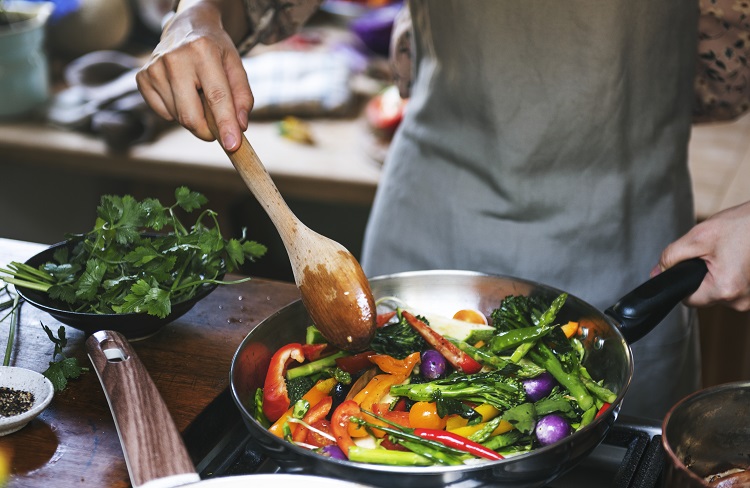 1. Not preheating your pan
1. Not preheating your pan
No matter what you are cooking, always make sure you start off with a hot pan. If you don’t, it will take longer for the dish to cook and will increase the risk of overcooking your food.
2. Leaving spoons on the counter whilst cooking
It’s very easy to just give your food a stir and then place the spoon on the countertop until you need it again. Although you try and keep your kitchen tops clean, so many items are placed on it daily, from shopping bags to pets, so you can never be too careful. Place the spoon on a plate or spoon rest instead.
3. Using dull knives
Although you may think shaper knives are more dangerous, this is not always the case. Having sharp knives for cutting food means you don’t need to add as much pressure to cut. With blunter knives, more pressure is needed which, if you slip, if more likely to cause injury. Sharper knives are also better for chopping ingredients up more precisely and finely.
4. Not drying your salad
Despite food labels saying the food has already been washed, it’s always a good idea to wash your salad again. However, when people are in a rush, they do not always take the time to dry the salad off. Use a salad spinner to dry the salad quickly, resulting in a much better looking and tastier salad that is not sitting in a pool of water.
5. Letting food sit before placing it in the fridge
Whilst many people claim the correct way to deal with leftovers is to wait for the food to become room temperature before placing it in the fridge, they are mistaken. The main reason behind this was that fridges were not the best at coping with the rise in temperature. Modern day fridges do not have the same problem and can cope with the temperature change well. It’s important to place the food in the fridge as soon as possible rather than leaving it out on the side. Letting your food stay warm for longer means you are increasing the time it spends in the bacteria promoting zone which can be potentially dangerous for your health.
6. Cooking wet vegetables
If your place your vegetables in the oven straight after they have been washed, they will probably turn out soggy. Dry them off first before roasting to ensure they come out crispier.
7. Cutting meat straight after cooking
After your meat is cooked, give it time to rest before cutting it. Especially for steak and beef, cutting it too quickly will mean moisture will not be retained as well and will lead to pooling on the plate, and drier tasting meat.
8. Using dried herbs instead of fresh
Dried herbs and spices are great things to use as they are convenient and have a long shelf life, however they do not have as much moisture as the fresh version and therefore the flavour is stronger. This needs to be considered before using them and adjust the quantity accordingly.
9. Seasoning food at the end
Don’t wait too long to add your herbs and spices. A lot of people quickly season a meal at the end as an afterthought. Adding the seasoning as you cook will give it time for the flavours to develop and will stop the dish tasting too spicy or salty.
10. Not reading the recipe
Always read the recipe to the end. And read it at least once. You don’t want to be halfway through the recipe when you realise you had to marinade something overnight or have realised you do not have all the ingredients.
11. Keeping butter in the fridge
Its sometimes a natural reaction to place things in the fridge, however some items do not need to be in there, including butter. Along with temperature, moisture and protein are two other factors that affect the level of bacteria in foods which can make them potentially dangerous. Although butter contains a fair amount of moisture, there is hardly any protein, meaning that doesn’t need to be in a fridge. Place a cover over the butter to make sure it’s not affected by light and oxygen.
12. Overfilling your pan
Finally, when you are in a rush, putting everything in the pan at once can seem like the simplest and quickest solution, however this can actually increase the cooking time and can risk some of the food not cooking properly. If you cook in batches the meal will be cooked better and will also taste better.
Do you know of any other bad cooking habits? Let us know what they are by connecting on social media @TimeForYouGroup